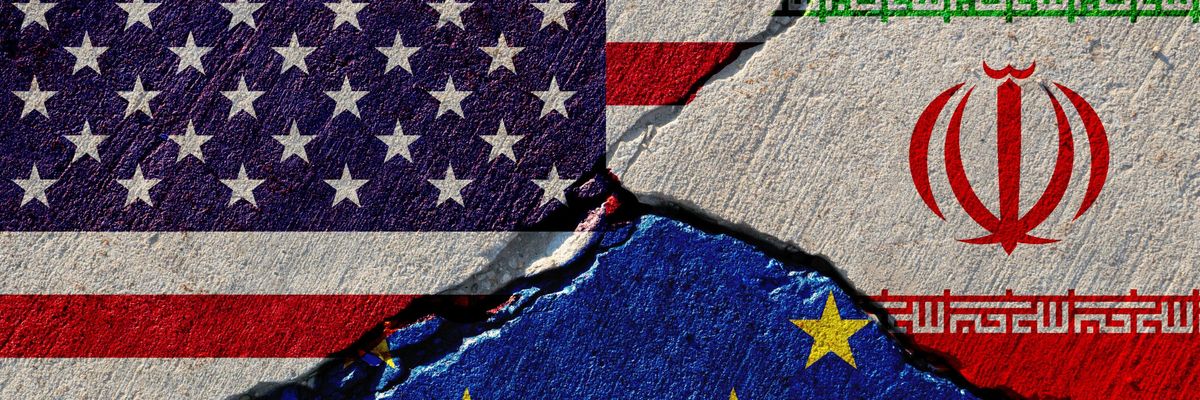More than 40 former top European officials, including former foreign and defense ministers from more than half a dozen countries, have called for the United States and Iran to quickly conclude their year-long negotiations to return to full compliance with the 2015 nuclear deal, the Joint Comprehensive Plan of Action.
In an open letter released by the Brussels-based International Crisis Group, the former officials warned that, absent a renewed accord, the two parties risk “enter[ing] a state of corrosive stalemate, serving neither side’s interests, that risks devolving into a cycle of increased nuclear tension, inevitably countered by the further application of coercive tools.”
The letter called on Washington, in particular, to “swiftly show decisive leadership and requisite flexibility to resolve the remaining issues of political (not nuclear) disagreement with Tehran,” a reference to the Biden administration’s apparent failure to date to decide whether to retain or drop Iran’s Islamic Republican Guard Corps on the State Department’s list of “Foreign Terrorist Organizations,” a designation made by the Trump administration as part of its “maximum pressure” campaign against Iran.
During the last year’s negotiations, Iran reportedly demanded that the IRGC be delisted as part of Washington’s return to compliance with the 2015 accord since the designation came after Trump’s withdrawal from the JCPOA but has since suggested a compromise whereby the IRGC’s Qods Force , which operates outside Iran’s borders, would remain on the list while the rest of the IRGC would be dropped. The Biden administration, worried about the domestic political consequences of being seen as compromising on the issue, has reportedly failed to respond officially to the proposal.
“We know that the politics of this issue are difficult, particularly on issues like the designation of the Islamic Revolutionary Guards Corps as a Foreign Terrorist Organization, which is reportedly the last lingering issue of contention,” according to the letter, which was signed by members of the Crisis Group, the European Leadership Network, and the European Council on Foreign Relations. “While the details are of course for U.S. policymakers to determine, we believe that there are ways to provide the counter-terrorism benefits of the current designation while still accommodating Iran's specific request, and consider it imperative that these be fully explored.”
If the letter was implicitly critical of the Biden administration’s failure to respond to Iran’s proposal or suggest an alternative compromise, it was withering about the Trump’s administration’s decision to withdraw from the JCPOA which it called “reckless.”
“The strategy that the U.S. followed for more than two years after this withdrawal, based on “maximum pressure” alone, yielded little but nuclear escalation, dangerous regional sparring and economic deprivation for the Iranian people,” it said. “The legacy of this strategic error can today be measured in the tons of enriched uranium Iran has since accumulated, including uranium enriched to near weapons-grade; in the thousands of advanced centrifuges it is spinning; and in the rapidly dwindling timeframe for Iran to reach a breakout capability.”
Current estimates suggest that Iran, which waited a full year after Trump’s withdrawal to significantly accelerate its enriched uranium production, could possess enough fissile material to manufacture one or more atomic bombs within weeks if it decided to do so. The JCPOA had placed strict limits on Iran’s nuclear program overseen by the International Atomic Energy Agency.
The letter underlined the importance and urgency of overcoming what it called the “period of stasis that threatens to undo the real and welcome progress made in recent months” in light of the war in Ukraine.
“At a time when transatlantic cooperation has become all the more critical to respond against Russia’s unprovoked invasion of Ukraine, for U.S. and European leaders to let slip the opportunity to defuse a nuclear crisis in the Middle East would be a grave mistake,” it asserted.
Among the signatories were the former prime ministers of Sweden and Norway, Carl Bildt and Gro Harlem Brundtland, respectively; as well as former IAEA director-general Hans Blix and former NATO Secretary-General Javier Solana, who also served as the European Union’s High Representative of the European Union for Foreign Affairs and Security Policy. Former foreign ministers of nine European nations also signed the letter.















